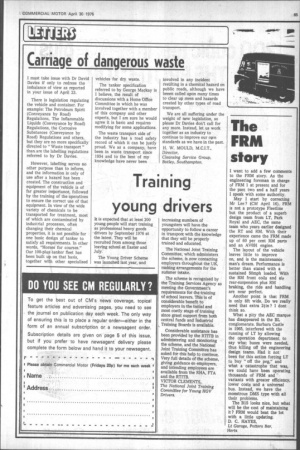Carriage of dangerous waste
Page 67

If you've noticed an error in this article please click here to report it so we can fix it.
I must take issue with Dr David Davies if only to redress the imbalance of view as reported in your issue of April 23.
There is legislation regulating the vehicle and container. For example: The Petroleum Spirit (Conveyance by Road) Regulations, The Inflammable Liquids (Conveyance by Road) Regulations, the Corrosive Substances (Conveyance by Road) Regulations and others, but they are no more specifically directed to "Waste transport" than are the labelling regulations referred to by Dr Davies.
However, labelling serves no other purpose than to inform, and the information is only of use after a hazard has been created. The construction and equipment of the vehicle is of far greater importance, followed by the training of the operatives to ensure the correct use of that equipment. In view of the wide variety of chemicals to be transported for treatment, most of which are contaminated by industrial processes, often changing their chemical properties, it is not possible for one basic design of tanker to satisfy all requirements. In other words, "Horses for courses." Our 100-plus tanker fleet has been built up on that basis, together with other specialised vehicles for dry waste.
The tanker specification referred to by George Mackay is I believe, the result of discussions with a Home Office Committee in which he was involved together with a member of this company and other experts, but I am sure he would agree it is basic and requires modifying for some applications.
The waste transport side of the industry has a road safety record of which it can be justly proud. We as a company, have been in waste transport since 1934 and to the best of my knowledge have never been involved in any incident resulting in a chemical hazard on public roads, although we have beeen called upon many times to clear up mess and hazards created by other types of road transport.
We are all suffering under the weight of new legislation, so please Dr Davies don't call for any more. Instead, let us work together as an industry to continue to improve our own standards as we have in the past.
H. W. MOULD, M.C.I.T., Director.
Cleansing Service Group, Botley, Southampton.
















































































































































